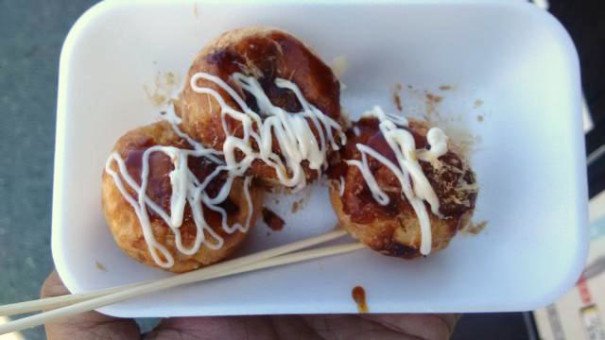
How to Solve a Brief Existential Breakfast Crisis

How to Solve a Brief Existential Breakfast Crisis
Takoyaki in Takayama
Parking my blue rental bicycle and looping its chain lock around the back wheel, I rise up to look at the gentle crowd thronging the Miyagawa morning market in Takayama, a mountain town in Gifu prefecture, northeast of Tokyo. The narrow lane by the river is filled with shops on both sides selling everything from miniature squashes and aubergines to wasabi-flavored pumpkin seeds and skewered beef. Rice crackers piled in cane baskets sit demurely by shops and announce in charmingly translated English, “Don’t think FEEL! by your tongue.”
River Miyagawa, from which the morning market derives its name, flows gently to one side, embodying the Japanese notion of elegance. Pale orange koi congregate in its glassy shallow waters, which I mistake for salmon. Two elderly women with wispy hair, bright lipstick, and glasses perched on their noses shake their heads vigorously in disagreement when I question whether the fish were indeed salmon. “Koi,” they chime together as if singing a refrain in a Japanese morning market song.
I had sauntered into the market in the hope of finding my morning breakfast. Supermarket sushi triangles, though inexpensive, are getting quite repetitive. As if a sharp-toothed mouse is gnawing at my innards, my hunger pangs push me in search of food. There is the ubiquitous ramen; huge, flat circles of rice crackers dipped in gloriously dark soya sauce; the region’s famed hida beef, smoky and speared on slender bamboo sticks; and, of course, sushi. I can’t quite decide my meal. I am having a brief breakfast existential crisis.
And then I see it. A young woman in a red-and-white striped apron and black top pours ladles of batter—about the consistency used for pancakes—into a special griddle with shallow indentation that holds just enough oil to fry the balls. Takoyaki, I silently scream. Among the numerous nameless dishes I’ve had in Japan during my travels in the past two weeks, here is one I already know and share some connection with. No other dish shares the affinity I have with Takoyaki because Takoyaki looks exactly like one of my favorite South Indian breakfast staples: paniyaram, or paddu.
Where I come from, paniyaram is usually reserved for weekend breakfasts at home because the greasy lusciousness of the oil-soaked orbs slows down the day’s progress and a mid-morning nap is all but mandatory after consumption. The thoroughly fermented batter of rice and black gram— tempered with onion, split peas, mustard, green chillies, and asafetida—is poured into a paniyaram plate and fried. This batter is typically made for idlis and dosas, other staple breakfast dishes on a South Indian breakfast table. My mother usually uses leftover, week-old batter for paniyaram because extra fermentation equals extra fluffiness.
But a paniyaram—of a sort—with octopus in it, as takoyaki is made? It’s as exotic as paniyaram gets. The first time I ate takoyaki there was no tako (octopus) in it. A friend, knowing my affinity to Japanese food, made it at his home when I was visiting him in Malaysia.
From the annals of cyberspace, I learn that a vendor from Osaka named Endo Tomekichi came up with the recipe in 1935. The city of Osaka ran with the idea and now the dish is so famous there are gift shops selling takoyaki-shaped souvenirs in the city. For deeper knowledge of the dish, there is even a takoyaki museum in Osaka.
Presently, I approach the vendor. An old woman, half standing on her cycle, is buying takoyaki by the dozen. “Very delicious,” she raises her hand at me, her index finger and thumb curled in appreciation. I get three, served on a styrofoam plate with squiggly mayo drizzle and bonito flakes, and stand aside watching the vendor maneuver the cooked batter only with two slender toothpicks. Chewing the bits of octopus in my breakfast, I also chew on the similarities between paniyaram and takoyaki. I wonder if the woman dishing out my breakfast would like my mom’s paniyaram as much as I like her takoyaki.